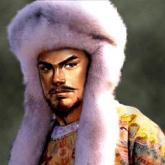 | Emperor Jin Shizong was the grandson of Wanyan Aguda, the founder of Jin Dynasty, and the son of the famous early-Jin general Wanyan Zongfu. Wanyan Wulu’s father died when the boy was only 12 years old, and he grew up under the influence of his mother, who had come from a sinicized Bohai gentry family from Liaoyang. After her husband’s death, Wulu’s mother preferred to become a nun instead of remarrying one of her husband’s relatives, as was the Jurchen custom. Thanks to his mother and her relatives, Wulu received a good Han education, and had as good knowledge of Chinese classics as any other |
Han emperors.Emperor Jin Shizong is said to have also been greatly influenced by the wife he had before becoming emperor. Her birth name was Wulinda. She advised Wulu to be patient and to pretend to be loyal to his cousin Wanyan Liang, the then reigning Emperor Hailingwang. Emperor Hailingwang admired his cousin’s wife. In 1151, he called her to his inner court, but she committed suicide. This event resulted in deep enmity between the two cousins.
In 1161, Emperor Hailingwang invaded the Southern Song to reunify China under the Jurchen rule. He also sent agents to assassinate many of his own relatives and thus to cement his power within the Jin state. Wulu, also on the hit list, raised a rebellion against Emperor Hailingwang. The rebellion was supported by many Jurchen officers and aristocrats dissatisfied with Emperor Hailingwang’s policy of administrative centralization and cultural sinicization, and the human cost of Emperor Hailingwang’s southern adventure. The emperor was soon murdered, and Wulu was able to become the new ruler of the empire without actually fighting Emperor Hailingwang.
Once on the throne, Emperor Jin Shizong reversed Emperor Hailingwang’s plan for invading Southern Song, as well as his domestic sinicization policies. Although conversant with Han culture himself, Emperor Shizong thought that the Jurchens’ strength was in maintaining their simple and sincere style, culture, and would often attribute Emperor Hailingwang’s defeat to his wholesale abandonment of it. He wasn’t opposed Chinese culture. In fact, he once claimed that the “natural and honest” Jurchen way of life was much like what the ancient Han sages taught. But he thought that merely reading the classics without putting their ideas in practice was counterproductive.
Emperor Shizong confiscated large areas of unused land and land that had been grabbed by a few large Jurchen landowners, and redistributed it to the Jurchen settlers in North China. But many Jurchen still preferred not to work their land plots, but lease them to Chinese farmers, and engage in heavy drinking instead. The emperor criticized his people for losing their martial spirit and military skills, such as archery and riding. To give example to his subjects, Shizong made hunting an annual royal activity in 1162, and until 1188 he went hunting almost every autumn and winter.
Early in his reign, Shizong chose 3,000 Jurchen men to study the Jurchen language. In 1173, the state started offering jinshi degrees (an examination for recruitment of government officials) in Jurchen, and opened the Jurchen Imperial Academy in the capital and local schools in all the circuits of the empire. By offering the jinshi examinations in Jurchen, Jurchen scholarship was promoted and recruit state officials were recruited. Many Jurchen jinshi degree holders ended up working as teachers of the Jurchen language and of the Chinese classics in Jurchen translation. As part of his promotion of the Jurchen culture and language, Emperor Shizong started a program of translating Chinese classics into Jurchen soon after ascending the throne. By the end of the Dading era, many other Chinese classics become available in Jurchen as well. |